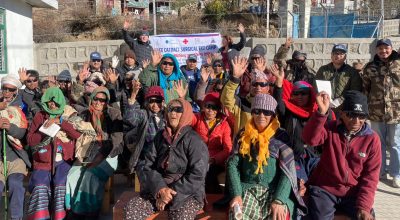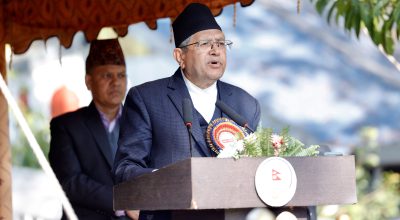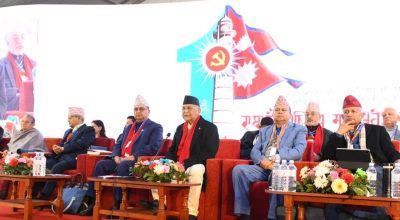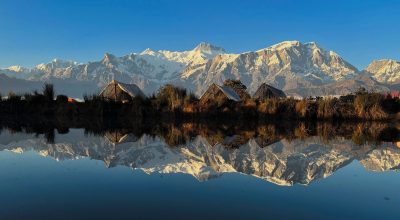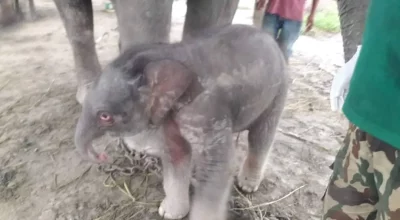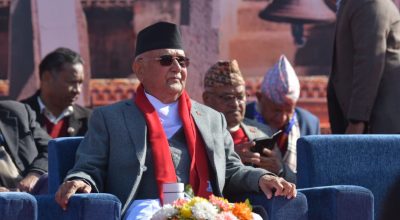
Kathmandu, Feb 6: The so-called identity ideologue groups (Pahichanbadi) opposing the Pathivara Cable Car project, a project developed by IME Groups, in Taplejung have intensified their protests, extending their actions toward Global IME Bank and it’s Chairman Chandra Dhakal. This has raised widespread concerns as the largest commercial bank in Nepal becomes the target of organized attacks. Experts believe if the bank is affected or the cable car construction is halted, it could trigger significant debates on Nepal’s economic, social, and political landscapes, particularly on investments from private sector in Nepal’s infrastructure.
Under the guise of protests, these groups have taken actions such as surrounding Global IME Bank branches in various districts of Koshi Province, blocking customers from entering the bank, calling for account closures, and spreading rumors that the bank is on the verge of collapse. However, Global Bank’s CEO Surendra Regmi reassured customers that the bank adheres to “corporate culture” and Nepal Rastra Bank’s directives, urging them not to trust false rumors related to the cable car project.
Organized attacks and misuse of social media
Amid the protests, some individuals and YouTube channels have resorted to spreading misinformation and inciting fear on social media. A TikTok video posted by an account named Nepse Info (Yoho TV content) falsely claimed that “billions have been withdrawn, and thousands of accounts closed at Global IME Bank” within a short period of time. These baseless claims created panic among the public, suggesting that the bank was on the brink of collapse. The post claims that “a large number of customers are closing their accounts at Global IME Bank,” spreading rumors that if depositors don’t withdraw their money within a day or two, they may lose access to their funds. It further alleges that “over a billion rupees have already been withdrawn, and thousands of customers have closed their accounts,” according to so-called bank sources. The post also stirs fear among the public, suggesting that the bank is on the brink of collapse due to its alleged plan to expand business into a religious site in the east. It accuses Chandra Dhakal of using state power to suppress the local voice and forcefully push the construction of the Pathibhara Cable Car.
Adding to the controversy, medical entrepreneur Durga Prasai and activist Dr. Surendra KC traveled to Taplejung to join the protests, advocating against the cable car project with rhetoric harsher and more provocative than that of identity groups. Their statements have fueled tensions further.
State authorities unresponsive
What’s more concerning is the passive stance of law enforcement. Despite threats, including written and verbal death threats against bank officials and those involved in the cable car construction, the police have failed to take effective action. Some protesters even threatened to bomb the cable car site if the project proceeded.
Nepal’s business community, including the Federation of Nepalese Chambers of Commerce and Industry (FNCCI), Confederation of Nepalese Industries (CNI), and Nepal Chamber of Commerce, have issued statements condemning the disruptions. They warned that such incidents would harm Nepal’s investment climate and discourage both domestic and international investors.
In the context where the local government and residents are in favor of constructing the cable car, external intervention and obstruction of its construction is not only unfortunate but also a deliberate attempt to hinder the flow of development. All the stakeholders including federal, provincial and local governments have urged for the smooth continuation of the project. Even, local people of Pathivara area have been demanding to construct the cable car.
While local authorities and residents support the cable car project, external intervention has hindered its progress. Six-point agreements were recently reached between the government and protesters, temporarily halting construction and agreeing to further discussions. However, identity group leaders remain firm in their opposition, with one youth leader, Bishnu Thamden, declaring, “Even if the cable car is made of gold, we will destroy it.”
Globally, many remote religious sites have benefitted from infrastructure such as cable cars, helicopters, or roads. Proponents of the Pathivara Cable Car argue that such development would boost tourism and economic growth further. Still, the conflict between development and identity politics in Nepal is far from over. Only time will reveal whether the project can proceed or remain a symbol of missed opportunities. #nepal #cablecar #ChandraDhakal #IME #GBIME






